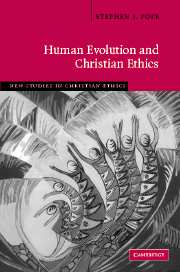Book contents
- Frontmatter
- Contents
- General editor's preface
- Acknowledgments
- Introduction
- Chapter 1 Evolution and religion
- Chapter 2 The indifference of Christian ethics to human evolution
- Chapter 3 Varieties of reductionism
- Chapter 4 Faith, creation, and evolution
- Chapter 5 Chance and purpose in evolution
- Chapter 6 Human nature and human flourishing
- Chapter 7 Freedom and responsibility
- Chapter 8 Human dignity and common descent
- Chapter 9 Christian love and evolutionary altruism
- Chapter 10 The natural roots of morality
- Chapter 11 Natural law in an evolutionary context
- Chapter 12 Sex, marriage, and family
- Bibliography
- Index of scriptural citations
- Index of names and subjects
Chapter 2 - The indifference of Christian ethics to human evolution
Published online by Cambridge University Press: 26 June 2009
- Frontmatter
- Contents
- General editor's preface
- Acknowledgments
- Introduction
- Chapter 1 Evolution and religion
- Chapter 2 The indifference of Christian ethics to human evolution
- Chapter 3 Varieties of reductionism
- Chapter 4 Faith, creation, and evolution
- Chapter 5 Chance and purpose in evolution
- Chapter 6 Human nature and human flourishing
- Chapter 7 Freedom and responsibility
- Chapter 8 Human dignity and common descent
- Chapter 9 Christian love and evolutionary altruism
- Chapter 10 The natural roots of morality
- Chapter 11 Natural law in an evolutionary context
- Chapter 12 Sex, marriage, and family
- Bibliography
- Index of scriptural citations
- Index of names and subjects
Summary
Most approaches to Christian ethics assume that the natural sciences have little or nothing to contribute regarding the issues that they care about the most. This assumption runs against the theological bent of the tradition of Christian ethics, and especially against those streams that give a central place to human flourishing.
The variety of ways in which science and theology, and science and religion, have been related to one another is more or less replicated in discussions of the relation between evolution and Christian ethics. John Haught traces four modes of relating science and religion – “conflict,” “contrast,” “contact,” and “confirmation.” This book recognizes that each of these responses is appropriate for various evolutionary positions. Christian ethicists tend to view evolution in one of three basic ways: as misleading and dangerous (“conflict”), as irrelevant (“contrast”), and as helpful (“contact” and “confirmation”). Christian ethicists generally tend to presume the irrelevance position: they accept the fact of evolution, show indifference to the theory of evolution, and reject naturalistic ontology. In this chapter I examine the two major approaches to Christian ethics that display the most consistent indifference to science in general and evolutionary theory in particular, namely, narrative theology and natural-law theory. The figures chosen for this chapter are representative of broad movements within Christian ethics; weaknesses in these positions reflect variations on weaknesses found in related schools of thought as well.
Disciplinary specialization presents a reason for theological indifference.
- Type
- Chapter
- Information
- Human Evolution and Christian Ethics , pp. 32 - 55Publisher: Cambridge University PressPrint publication year: 2007



